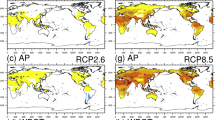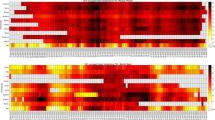Abstract
Recent research has established that individuals’ perception of global warming is malleable such that individuals report that it is a more serious problem when they experience higher outdoor or indoor temperatures (Li et al. Psychological Science, 22(4), 454–459, 2011; Risen and Critcher Journal of Personality and Social Psychology, 100(5), 777–793, 2011). We extend these findings on the experience of actual temperature by testing whether the embodied experience of temperature, manipulated by participants chewing cinnamon or mint gum, can activate the concept of temperature and influence perception of global warming. As predicted, compared to those who did not chew gum, those experiencing embodied temperature through chewing gum reported greater concern for global warming, but not other social problems, and were more likely to volunteer for a global warming group on campus. This suggests that the physical experience of tasting cinnamon or mint gum activated the larger conceptual system of temperature changes that subsequently influenced beliefs about global warming.



Similar content being viewed by others
References
Bargh, J. A., & Shalev, I. (2012). The substitutability of physical and social warmth in daily life. Emotion, 12(1), 154–162. doi:10.1037/a0023527.
Barsalou, L. W. (1999). Perceptual symbol systems. Behavioral and Brain Sciences, 22(4), 577–660. doi:10.1017/S0140525X99002149.
Berman, M., Jonides, J., & Kaplan, S. (2008). The cognitive benefits of interacting with nature. Psychological Science, 19(12), 1207–1212. doi:10.1111/j.1467-9280.2008.02225.x.
Fitzsimons, G., Chartrand, T., & Fitzsimons, G. (2008). Automatic effects of brand exposure on motivated behavior: how apple makes you ‘think different’. Journal of Consumer Research, 35(1), 21–35. doi:10.1086/527269.
Holland, R. W., Hendriks, M., & Aarts, H. (2005). Smells like clean spirit: nonconscious effects of scent on cognition and behavior. Psychological Science, 16(9), 689–693. doi:10.1111/j.1467-9280.2005.01597.x.
Joireman, J., Truelove, H. B., & Duell, B. (2010). Effect of outdoor temperature, heat primes and anchoring on belief in global warming. Journal of Environmental Psychology, 30, 358–367. doi:10.1016/j.jenvp.2010.03.004.
Kang, Y., Williams, L. E., Clark, M. S., Gray, J. R., & Bargh, J. A. (2011). Physical temperature effects on trust behavior: the role of insula. Social Cognitive and Affective Neuroscience, 6(4), 507–515. doi:10.1093/scan/nsq077.
Kellstedt, P. M., Zahran, S., & Vedlitz, A. (2008). Personal efficacy, the information environment, and attitudes toward global warming and climate change in the United States. Risk Analysis, 28, 113–126. doi:10.1111/j.1539-6924.2008.01010.x.
Li, Y., Johnson, E. J., & Zaval, L. (2011). Local warming: daily temperature change influences belief in global warming. Psychological Science, 22(4), 454–459. doi:10.1177/0956797611400913.
Liljenquist, K., Zhong, C., & Galinsky, A. (2010). The smell of virtue: clean scents promote reciprocity and charity. Psychological Science, 21(3), 381–383. doi:10.1177/0956797610361426.
Niedenthal, P. M., Barsalou, L. W., Winkielman, P., Krauth-Gruber, S., & Ric, F. (2005). Embodiment in attitudes, social perception, and emotion. Personality and Social Psychology Review, 9(3), 184–211. doi:10.1207/s15327957pspr0903_1.
Risen, J. L., & Critcher, C. R. (2011). Visceral fit: while in a visceral state, associated states of the world seem more likely. Journal of Personality and Social Psychology, 100(5), 777–793. doi:10.1037/a0022460.
Schuldt, J. P., Konrath, S. H., & Schwarz, N. (2011). “Global warming” or “climate change”? Whether the planet is warming depends on question wording. Public Opinion Quarterly, 75, 115–124. doi:10.1093/poq/nfq073.
Williams, L. E., & Bargh, J. A. (2008). Experiencing physical warmth promotes interpersonal warmth. Science, 322(5901), 606–607. doi:10.1126/science.1162548.
Zhong, C., & DeVoe, S. E. (2010). You are how you eat: fast food and impatience. Psychological Science, 21, 619–622. doi:10.1177/0956797610366090.
Zhong, C., Bohns, V., & Gino, F. (2010). Good lamps are the best police: darkness increases dishonesty and self-interested behavior. Psychological Science, 21(3), 311–314. doi:10.1177/0956797609360754.
Author information
Authors and Affiliations
Corresponding author
Rights and permissions
About this article
Cite this article
Lewandowski, G.W., Ciarocco, N.J. & Gately, E.L. The Effect of Embodied Temperature on Perceptions of Global Warming. Curr Psychol 31, 318–324 (2012). https://doi.org/10.1007/s12144-012-9148-z
Published:
Issue Date:
DOI: https://doi.org/10.1007/s12144-012-9148-z




